We’ve Compiled the 4 Best GoDaddy Alternatives for Web Hosting in 2024
If you click to purchase a product or service based on our independent recommendations and impartial reviews, we may receive a commission. Learn more
GoDaddy has an excellent domain registrar, its website builder is pretty nifty, and it offers web hosting services but it’s not necessarily the web host for you.
Luckily there are plenty of GoDaddy alternatives on the market that you can opt for, keeping your website running smoothly and securely.
Bluehost is our number one GoDaddy alternative. It blasts GoDaddy out of the water when it comes to things such as features, value for money, and security.
But it’s not your only option – we’ve got a total of four different alternatives to take you through in this guide. Let’s get started…
4 Best GoDaddy Alternatives
Want to make sure you know how GoDaddy fares compared with the hosting providers in this list? Check out our full GoDaddy hosting review.
1. Bluehost
Best overall hosting provider.
Bluehost simply can’t be beaten as a hosting provider in our minds. With a vast feature offering, great uptime stats, and plans spanning shared, dedicated, and VPS hosting for great prices, Bluehost is our top-rated GoDaddy alternative.
✔️ Who Is Bluehost Good For?
If you’re using WordPress then Bluehost couldn’t be more perfect, since this hosting provider is WordPress-recommended!
Read our full Bluehost review for more details.
Bluehost Pros and Cons
| Bluehost Pros | Bluehost Cons |
|---|---|
| Seamless WordPress integration. Bluehost is WordPress-approved. | US-only data centers can limit international site speeds. |
| Prices to suit any budget and that don’t increase too much with renewal. | You have to pay extra to migrate an existing website to Bluehost. |
| Even the most basic plans are packed full of reliable features. |
Plans and Pricing
There are four shared hosting plans available on Bluehost, with prices starting at just $1.99 per month when you sign up for 12 months on the most basic plan.
The Choice Plus plan is ideal for small and medium-sized businesses, with 40GB SSD storage, a free SSL certificate, and a free domain for the first year, all included for $3.49 per month (on a 12-month contract).

In comparison, to get the same features with GoDaddy you’ll need to sign up for a Web Hosting Deluxe plan that will set you back $9.99 per month.
Both Bluehost and GoDaddy raise their prices once the initial period is over too. While the Bluehost Choice Plus plan will renew at $8.99 per month, GoDaddy’s Web Hosting Deluxe plan will set you back $13.99 per month if you choose to renew. Pricey.
Read our Bluehost Pricing Review for more help picking your plan.
Performance and Reliability
No hosting provider can guarantee 100% uptime but you need one that comes pretty close. After all, if your website is down you’re losing out on traffic and potential customers.
Bluehost guarantees an uptime of 99.98%, you don’t get much closer to 100% than that…unless you’re GoDaddy. GoDaddy claims to offer an uptime of 99.99%, just beating Bluehost.
We’ll be honest though, this 0.01% isn’t going to make all that much difference to your website’s uptime, and actually in our testing we found GoDaddy sometimes fell slightly short of its promise anyway.
No hosting provider is perfect and while Bluehost may be our top-rated hosting provider, there is one particular area where it could be improved. All of its data centers are in the US, which means if you’re targeting an international audience you may have some minor problems with site speeds.
To compare, GoDaddy has data centers located across America, Europe, and Asia.
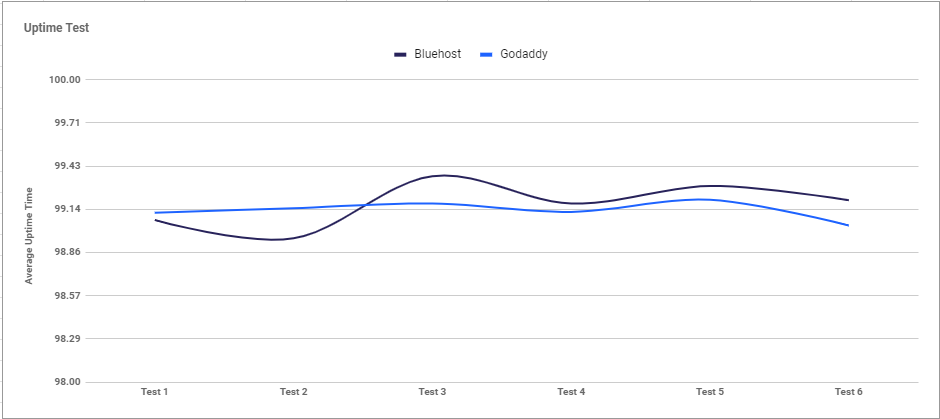
Usability
Bluehost is perfect for beginners. Its control panel is user-friendly and easy to navigate thanks to cPanel integration, an industry standard.
If you’ve never built a website before there’s a handy checklist within the customer management panel for you to follow and there are tools such as Google My Business and Google Ad Management included in all plans to help you keep everything in one place.
Customer support is also easy to access with 24/7 live chat and phone support on offer (also offered by GoDaddy). Bluehost also has a host of online resources available in its on-site Knowledge Base, with the quality of help on offer here far outshining GoDaddy’s.
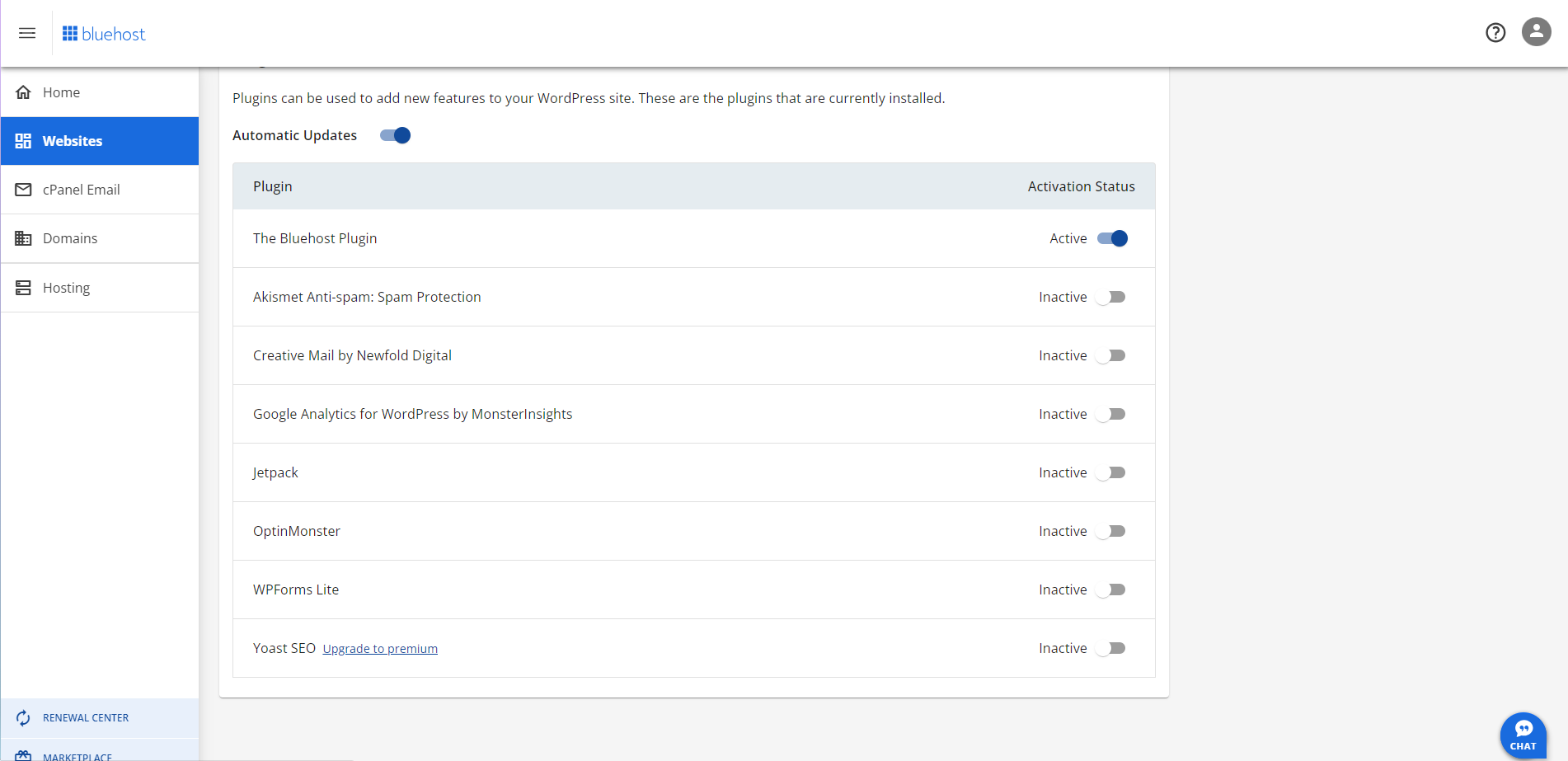
Scalability
Bluehost is a good choice if you’re planning to scale your business, with dedicated and VPS hosting plans also on offer that allow you to accommodate more resources as your business grows.
Even shared hosting plans offer up to 100GB SSD storage, with the Pro plan also optimized for high traffic volume (although Bluehost is vague on exactly how much traffic this plan can actually support).
GoDaddy meanwhile claims to offer unlimited bandwidth but in all honesty, there’s a lot of fine print involved and it’s unclear just how unlimited this actually is.
Further Reading
Take a look at our Bluehost vs GoDaddy guide to directly compare the two.
2. HostGator
Best for shared hosting.
Packed full of features, reliable uptime, and easy to use, HostGator comes in a close second on our list of GoDaddy alternatives.
✔️ Who Is HostGator Good For?
With good value for money, HostGator has some of the best shared hosting plans on the market. Not to mention, its help and support continuously comes out top in our testing, making it a great choice for beginners!
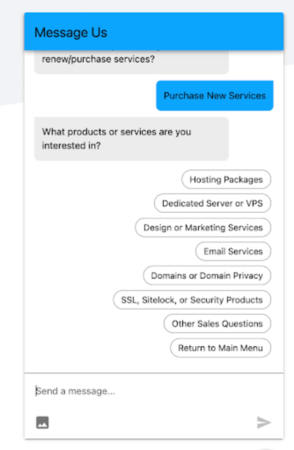
Read our full HostGator review for more details.
HostGator Pros and Cons
| HostGator Pros | HostGator Cons |
|---|---|
| Great features are included as standard including free domain and free SSL certificate. | No specific ecommerce hosting plans. |
| The best shared hosting plans for small businesses and blogs on the market. | Help and support can be unreliable. |
| Unrivalled uptime of 99.99% |
Plans and Pricing
HostGator has three shared hosting plans available, the Hatchling plan that costs $2.75 per month (bonus point for the cute name), the Baby plan for $3.50 per month, and the $5.25 per month Business plan (all prices for 12-month plans).
While there’s one less plan on offer than GoDaddy, you don’t lose anything, HostGator has simply streamlined its plan offering to keep things simple.

The Baby plan ($3.50 per month) comes with 20GB SSD storage, a free SSL certificate, and a free domain for the first year, features that will set you back $9.99 per month with GoDaddy.
While HostGator’s prices might be cheaper than GoDaddy initially, when it comes to renewal the Baby plan will rise to $14.99 per month, $1 more than the GoDaddy alternative.
Read our HostGator Pricing Review for a more detailed rundown of its plans and prices.
Performance and Reliability
HostGator offers a 99.99% uptime guarantee, matching that offered by GoDaddy. HostGator also offers a monthly credit if your website ends up being down for more than nine hours per year. One of our favorite HostGator perks.
Like Bluehost, all of HostGator’s servers are located in the US, not a major issue but something to consider if you’re targeting an international audience.
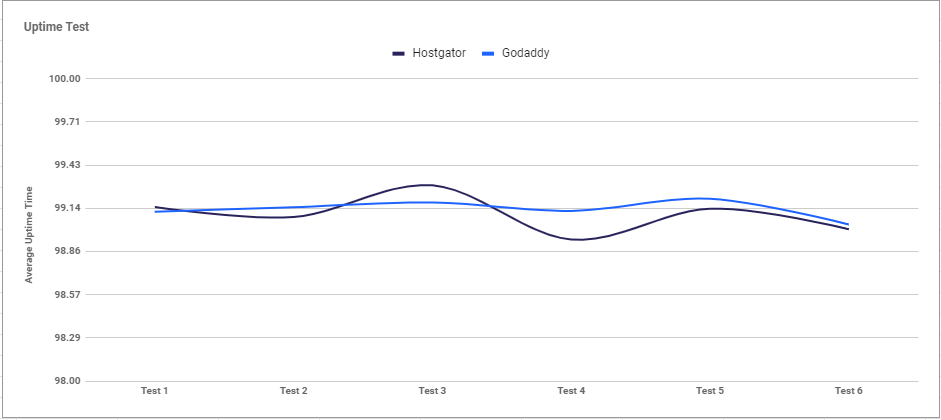
Usability
HostGator is easy to use no matter what your skill level, thanks to the cPanel integration that makes the control panel easy to navigate and get to grips with.
There’s one-click install available for all of the most popular apps (something also offered by GoDaddy) and if you already have a .com domain, you can simply transfer your domain over to HostGator free of charge (a task that costs $10.99 on GoDaddy).
HostGator offers a good level of support for customers, with 24/7 live chat available on all plans. If you want access to phone support, however, you’ll need to be on the Baby plan or above. GoDaddy, on the other hand, offers this to everyone.
It’s also good to note that HostGator outsources its support to external agents, meaning it can be a lucky dip as to how good the agent is at answering your questions.
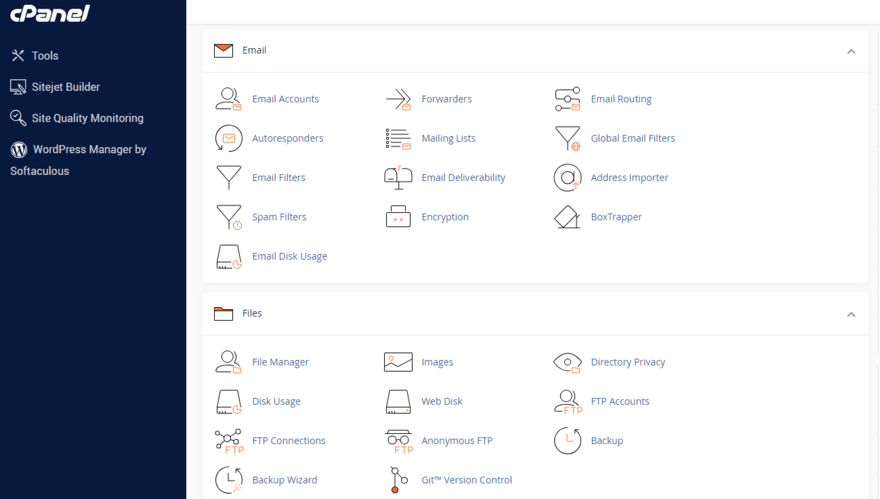
Scalability
When it comes to scalability HostGator is a little confusing about what’s actually on offer for users.
It claims to offer unmetered bandwidth, however users cannot exceed 25% of system resources for more than 90 seconds. If you do, your site speed will be impacted. The problem here is that HostGator isn’t clear exactly what that 25% equates to.
Realistically HostGator can support the demands of most small and medium-sized businesses, but if you’re expecting to scale to considerable levels, you may run into some problems.
Further Reading
Take a look at our HostGator vs GoDaddy guide to directly compare the two.
3. IONOS
Best value for money.
If you’re looking to keep costs low then IONOS is one of the best GoDaddy hosting alternatives, with prices starting at just $1 per month (on specific plans for specific contract periods).
✔️ Who Is IONOS Good For?
With great performance and load times also under its belt, IONOS is great for entrepreneurs just starting out on their web journey and small and medium-sized businesses.
Read our full IONOS review for more details.
IONOS Pros and Cons
| IONOS Pros | IONOS Cons |
|---|---|
| Some of the cheapest hosting plans on the market with amazing introductory offers. | Limited customer support options. |
| Unrivalled performance and site speed. | The control panel is clunky and outdated. |
| Great scaling support on offer. |
Plans and Pricing
IONOS offers some of the cheapest plans on the market so if GoDaddy’s prices are out of your budget, IONOS could be the ideal alternative. For example, you can get the Plus plan for just $1 per month for your first six months, which is designed for larger websites and comes with unlimited storage and bandwidth.
Without special offers, IONOS’ pricing starts at $4 per month on the Essential plan. The next plan up – the Starter plan – has everything small and medium-sized businesses need, including 100GB storage and daily backups, for $6 per month. To get 100GB storage on GoDaddy you’ll have to take out the most expensive $21.99 per month Web Hosting Maximum plan.

Like GoDaddy these prices will rise after the initial contract period, however, IONOS raise their prices sooner than most. While you’ll need to sign up for 12 months to get these rates, the rates rise after six, with the Starter plan rising to $8 after 6 months (so still cheaper than GoDaddy even after renewal).
Be sure to note that this based on paying for the full 12 months upfront, you won’t notice the monthly increase, it’s simply factored into your initial price.

Performance and Reliability
IONOS can’t be beaten when it comes to performance and site speed, blowing GoDaddy out of the water in all of our testing.
It’s particularly great for WordPress websites and overall IONOS aces a 99.99% uptime. Impressive.
You can also be sure that your website will load quickly with IONOS thanks to the provider’s 10 data centers across five countries. Performance and speed do vary slightly between the 10 data centers but all provide a speedy and secure service.
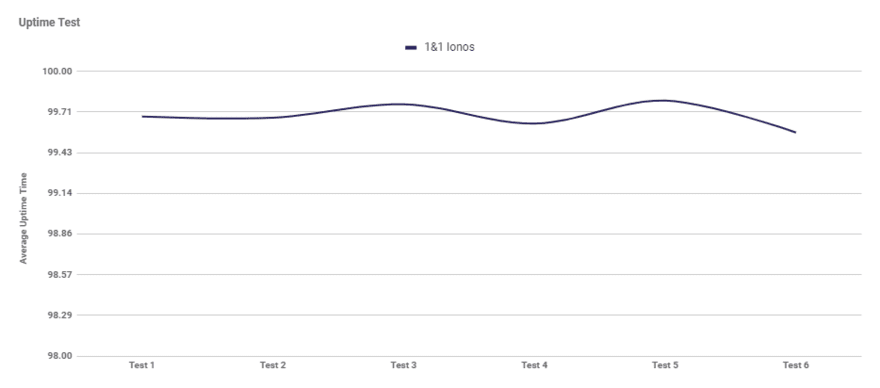
Usability
Most hosting providers on the market, including GoDaddy, use cPanel, a popular and reliable control panel, but not IONOS.
IONOS opts to use its own custom setup which, while professional, could do with some updating. It looks pretty dated and it can take a while to get to grips with, meaning it’s not the best for beginners or those who want a simple experience as a priority.
When it comes to customer support IONOS lets itself down. While there is 24/7 live chat and phone support, it can be hard to find an agent actually available to help. Not ideal.
While customer reviews should always be taken with a pinch of salt, many of the negative IONOS reviews focus on rude customer service agents, in contrast to GoDaddy where even the social media team is trained to offer support and advice to users.
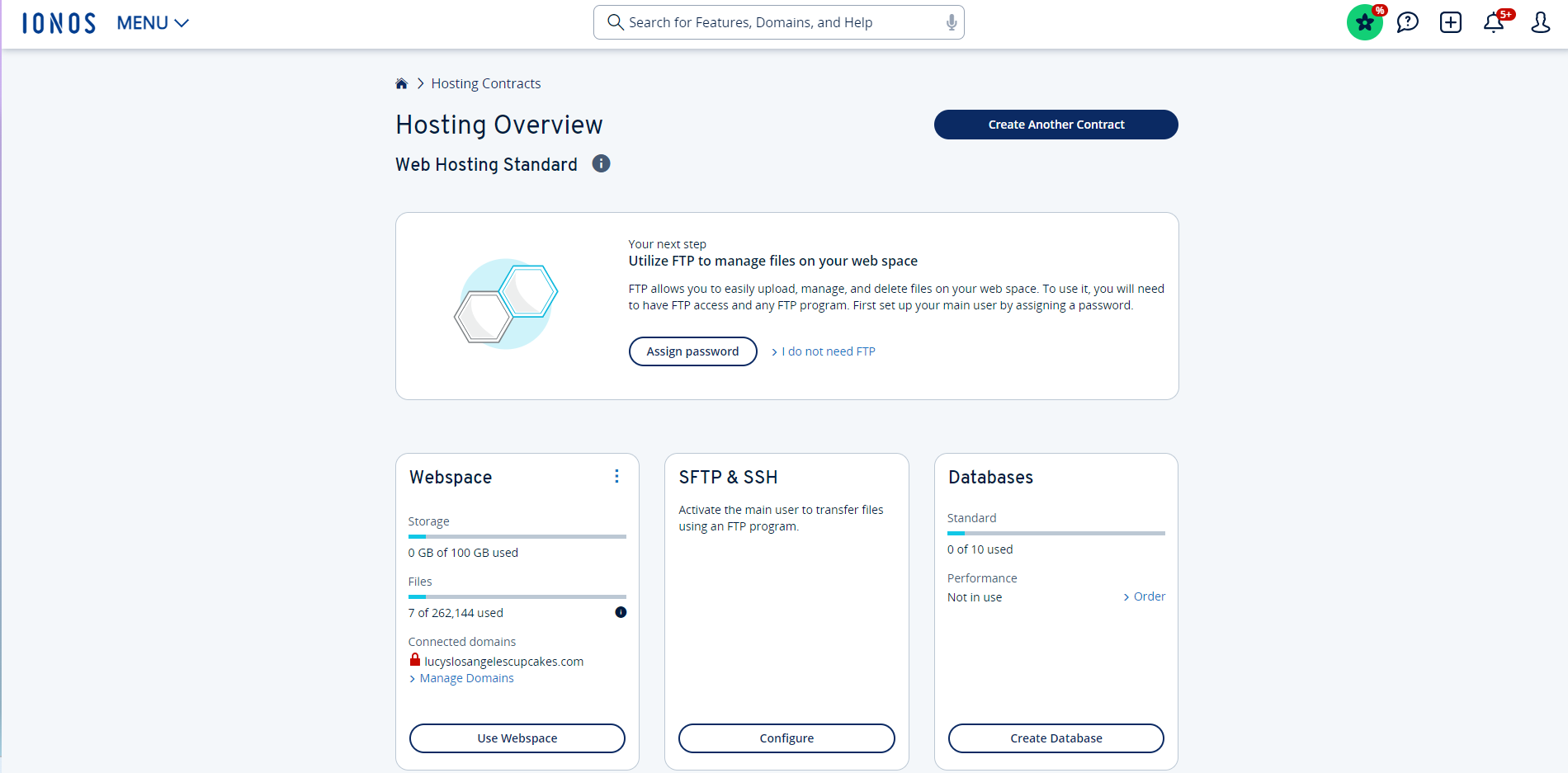
Scalability
IONOS is a great choice if you’re looking to scale your website, with unlimited storage and databases available on the top two shared hosting plans.
The Basic plan is optimized for 100 website visitors per minute. If you think you need more than this you’re in luck as the Plus and Ultimate plans can support 200 and 500 visitors per minute respectively.
IONOS is much clearer than GoDaddy about exactly how much traffic it can support on different plans. With GoDaddy the term “unlimited” is thrown around a lot, but customer reviews suggest this isn’t quite as it seems.
4. Hostinger
Best for ecommerce stores.
The final GoDaddy alternative in our list is Hostinger. Hostinger is a great hosting provider if you’re looking for a secure and speedy server and is particularly easy to use for beginners, thanks in part to its custom built hPanel control panel and built-in website builder.
✔️ Who Is Hostinger Good For?
There’s shared hosting, VPS hosting, WordPress hosting, and cloud hosting on offer, making it a good long-term solution for those who are hoping to scale in the future and for ecommerce stores.
Read our full Hostinger review for more details.
Hostinger Pros and Cons
| Hostinger Pros | Hostinger Cons |
|---|---|
| Multiple international data centers mean site speeds are fast for international users. | Customer support is limited. |
| Beginner-friendly control panel. | The bespoke hPanel control panel is slower than the industry standard cPanel. |
| Huge storage and visitor capability options. |
Plans and Pricing
Like all the other GoDaddy alternatives in this list, Hostinger prices vary depending on which plan you choose and how long you sign up for.
Shared hosting starts at $2.99 per month for the Premium plan but the best choice for most small and medium-sized businesses is the Business plan. Costing $3.99 per month when you sign up for 12 months, you’ll get access to 200GB NVMe storage, a free domain, a free SSL certificate, and daily backups.
A similar feature pack with GoDaddy will set you back around $9.99 per month.

As you’ve probably got to grips with by now, these prices are introductory offers. Pretty much every hosting provider operates the same pricing policy, offering a low introductory offer and then raising the rates when you renew.
To get the cheapest Hostinger price you have to commit to 48 months. There are pros and cons to this, on the one hand it means you don’t have to worry about renewal for 4 years but on the other, that’s a large commitment to make and you’ll be locked in for a long time. You’ll need to weigh up the pros and cons in order to decide if it’s a commitment you’re willing to make.
If/when you renew your Hostinger plan, you can expect the prices to rise pretty considerably. The Business plan for example will go from $3.99 per month to $13.99. This means that while the introductory offer is cheaper than GoDaddy, once you’ve renewed you’ll be paying the same amount for similar services with both providers.
Read our Hostinger Pricing Review to read more about its plans, deals, and fees.
Performance and Reliability
Hostinger is another reliable hosting provider, we wouldn’t include it in this list if it wasn’t, but in our testing we did find that it fell a little short of its 99.9% uptime guarantee.
When it comes to site speed and data centers, Hostinger is far and away one of the best, with data centers located in America, the UK, the Netherlands, Lithuania, France, India, Singapore, and Brazil. If targeting an international audience is a priority for you, Hostinger is the GoDaddy alternative to pick.
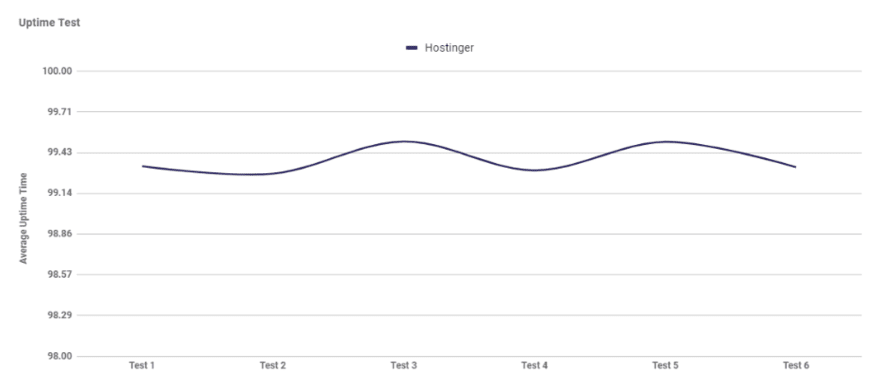
Usability
Hostinger has an easy-to-use control panel and there’s also easy WordPress setup included, meaning beginners can quickly and simply create their own WordPress blog or website.
Rather than the industry standard cPanel, Hostinger has created its own hPanel, which is just as easy to use and get to grips with as cPanel, however, it can feel a little clunky and slow compared to cPanel.
You’ll also have access to the Hostinger website builder in all plans, meaning it’s not only cheaper than building and hosting your website with WordPress, but the builder is more easily customizable too.
Hostinger offers users 24/7 live chat support – however, there is no phone support, unlike GoDaddy and alternatives such as Bluehost. The lack of phone support is a big letdown for Hostinger and users who like to jump on the phone to solve issues quickly.
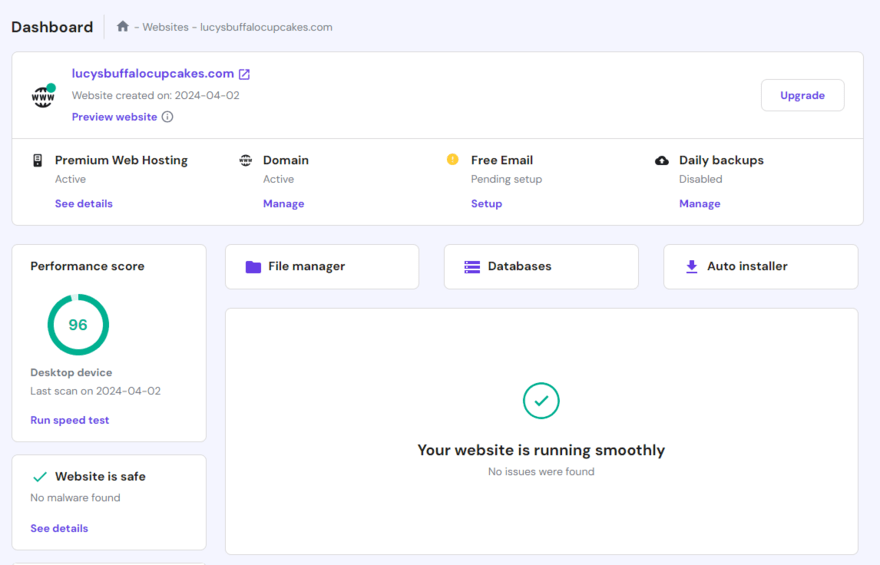
Scalability
Hostinger is pretty nifty at handling large volumes of traffic, with unlimited bandwidth available on every plan.
The popular Business plan comes with 200GB of NVMe storage, something that isn’t actually on offer with GoDaddy, where even the most expensive shared hosting plan only offers 100GB.
Hostinger is a great choice therefore not only for businesses that are planning to scale in the future but those that need a good amount of storage now, such as ecommerce stores.
Buying Guide: How To Choose a Hosting Provider
When it comes to choosing a GoDaddy alternative, there’s a lot to think about. After all, you’re trusting your chosen hosting provider to keep your website safe and secure and running optimally online.
With that in mind, some of the key things to consider when choosing a hosting provider are:
- Price – is there a plan within your budget? Will you be able to afford the renewal rates?
- Features – does the provider offer all the features you need? Think about what you need now and what you may need in the future.
- Uptime – what uptime guarantee does the provider offer? How often can you expect your website to be down?
- Security – how secure is the provider? Will it keep your website and data safe from online threats?
How We Test Hosting Providers
We take testing hosting providers seriously and would never recommend anything that we haven’t tried out for ourselves.
Our experts undertake a rigorous research process that’s independent, thorough, and covers all the important aspects including value for money, features, and market comparisons.
You can find out more about our research process on our dedicated page including a detailed breakdown of every step of our testing process.
Best GoDaddy Alternatives: Summary
GoDaddy is by no means a bad hosting provider. With multiple plans to suit all budgets, it can be a good choice. These four GoDaddy alternatives, however, are some of our favorite providers on the market, all packed full of features to help you run and scale your website.
Bluehost comes out in our research as our best overall hosting provider, but all of the providers in this article offer a reliable and secure service. They also all offer a 30-day money-back guarantee, meaning you can try one out for yourself and get your money back if you’re not happy.
If you’re currently using GoDaddy but feel ready to switch hosts, check out our guide to transferring web hosting for a simple process.
Leave a comment